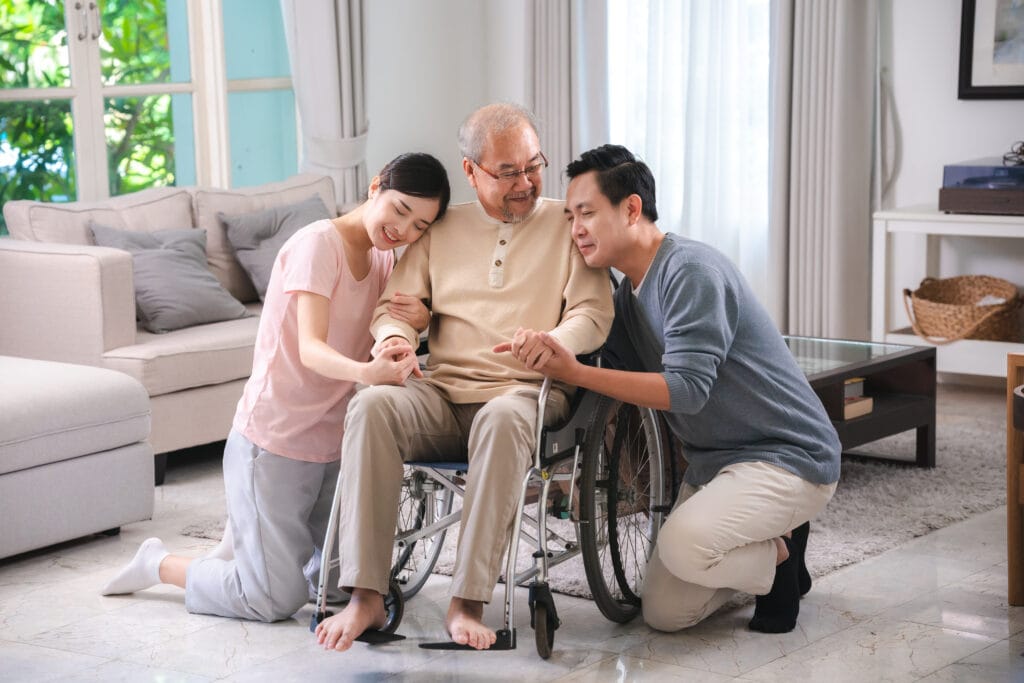Same topic
Topic "Memory loss in the elderly" with you to learn about related content and topics
Together to bring better healthcare solutions to the elderly.
-
Tips for Caring for the Elderly with Dementia
-
Intermediate Stage Dementia | Living with and Caring for
-
Early stages of dementia | living with and caring for
-
Improve your memory and mental health with 10 games
-
Treatment of memory loss in the elderly
-
Diet to prevent memory loss in old age
-
Signs of Alzheimer's disease and care tips
-
Distinguishing between age-related memory loss and dementia
-
Stages and Symptoms of Alzheimer's Disease
-
Causes of Alzheimer's disease and risk factors
The period between symptoms becomes more clear Compared with early-stage Alzheimer's, care is more difficult.
They may need more help with everyday tasks such as remembering or refusing to bathe, or dressing inappropriately for the weather. This is also often the longest stage of the condition.
At this stage, some daily activities may become a burden for the person with the disease. For family caregivers, the middle stage may mark the beginning of demands personal care frequent.
Managing Mid-Stage Alzheimer's Symptoms
Specific symptoms at each stage of the disease vary from person to person. However, here is an overview of some of the symptoms you may experience:
Memory loss
They may forget the names of familiar objects, forget to recognize family, friends…
As a family member, this can be difficult. However, there are ways to help caregivers cope with these difficult situations –
- Keep calm – it is important to remember that this is not intentional and respond in a calm voice, with a gentle correction and explanation.
- Use visual aids to remind of relationships, such as using photos, letters, or sentimental items, such as wedding rings, keepsakes.
Mood changes and behavior changes
People with dementia have more than just memory problems. Changes in mood and behaviour include becoming agitated and unable to keep still, shouting. Or repeating certain actions or asking the same questions over and over again. What carers can do to help include:
- Rate their safety: If they cannot calm down or act aggressively, it is time to consult a professional.
- Determine what the cause could be: Try to identify the underlying issues that are causing the mood swings – rule out needs like hunger, thirst or pain.

- Focus on their feelings – How do they act? What is their body language like? Does this match what they are saying?
- Attract them through activities and hobbies to change their thinking.
- Avoid controversy: You should not express disagreement in an exaggerated way.
Experience the illusion
Delusions can occur when a person is unable to control or 'regulate' intense thoughts. These beliefs are often based on very little evidence/unfounded suspicion.
They may also begin to experience hallucinations – seeing, hearing, smelling or feeling things that are not there. Many people find hallucinations disturbing or frightening, however, smelling a familiar perfume or hearing the caring voice of a deceased loved one can actually be comforting to someone with dementia.
- If a loved one is accusing you or someone else of something, try to figure out what might make them think that way – encourage them to share my thoughts
- Remember that the hallucinations are very real to them, so don't try to correct them. Instead, offer words of comfort. reassure and acknowledge their feelings
- You should be receptive and find alternatives, or perhaps involve your loved ones in these changes to ensure they feel heard.
Disoriented
Disorientation can be characterized by a feeling of mental confusion and loss of direction. Orientation problems can affect more than just their physical abilities. Things that can help support someone who is disoriented –
- Encourage gentle exercise to strengthen the body and help with coordination
- Keep a regular daily routine to help your child identify the time of day.
- Place signs around the house to help children find their way if they get lost or confused.
Incontinent
Unfortunately, brain degeneration affects the muscle groups needed to go to the bathroom. This can lead to a loss of bladder or bowel control, or both. Accidents can happen for a number of different reasons, including. –
- Not getting to the toilet promptly due to limited mobility or not responding quickly enough to the feeling of needing to go to the toilet
- Can't announce that they need to go
- Can't find or recognize where the toilet is when out
- Unable to accept that they have a problem or refuse help from others
This can be a difficult time for everyone involved! It is not easy to see a loved one in such a vulnerable situation. Some ways caregivers can take note:
- Watch for nonverbal signs that they need to use the bathroom, such as fidgeting or fidgeting.
- Make the bathroom obvious – by leaving the bathroom door open or painting it a contrasting color and placing signs with arrows and pictures around the house.
- Help them feel less demeaned by reminding them that it's just a bodily function. It can happen to anyone.
Language and communication
Communication can become more difficult in the middle stages of Alzheimer's disease and can lead to social withdrawal or isolation.
This can make it difficult to find the right words, or to judge your thoughts or use words appropriately. The important thing to remember is to be patient and willing to help.

- Try giving information in advance – For example, 'Hello Dad, my son is Tam', can act as a reminder.
- Reduce distractions – engage in face-to-face conversation, away from audio/visual distractions like radio, phone, television
- Maintain eye contact – Always look intently at your older loved one to maintain their focus on the conversation.
- Speak slowly in a gentle tone, using simple language. Make sure you are talking to an adult, not a child.
- Listen carefully to what they are saying. – Be patient and listen to their feedback.
Source elder.org
Planning for the End Stages of Alzheimer's
Although difficult to accept, early planning for the end stages of Alzheimer's can help alleviate some of the emotional and practical stress.
- Research the changes you can expect to see in your loved one's health and behavior.
- Find out what it means to be a carer – what challenges will you face? Do you have the capacity, skills and time to care?
- Look for long-term, sustainable, and professional care strategies such as home care service
- Don't be afraid to ask for help from all family members, friends or neighbors. This doesn't mean putting the responsibility on their shoulders, but having support from many people can also help the sick person feel better.
- Financial and legal planning: including creating wills, trusts and exploring options for funding long-term care.
Are you looking for home or facility-based care?
Hio is a pioneering platform providing comprehensive and personalized elderly care services at home and medical facilities. No additional costs, change caregivers without additional costs, immediate refund if customers are not satisfied, care information is continuously updated to ensure peace of mind for families.




